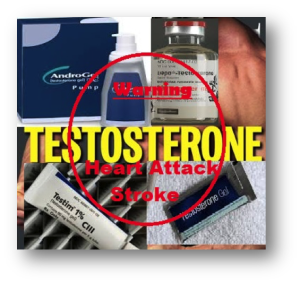As a Tennessee testosterone injury lawyer, we have been taking keen interest in exploring association between cardiovascular risks and low-T supplements ever since the first revelations took the nation by storm. There has been widespread allegation against manufactures over direct-to-consumer promotions and “selling of a non-existent disease” for profits. While abuse of testosterone supplements is known to cause heart attack and strokes, a recent study has made a comparative analysis of degree of threat posed by various types of low-T drugs.
JAMA Report on Evaluation of Low-T Supplement Risks
According to a report published in the JAMA Internal Medicine, low-t injections carry the highest cardiovascular complication risk compared to patches and gels. Based on the research by scholars from the Chapel Hill-based University of North Carolina, the study is a direct acknowledgement of heart attack and stroke risks, fatal incidents, and hospitalizations associated with testosterone drugs.
The study took into account half-a-million records obtained from insurance and Medicare claims between 2000 and 2012 both in the United States and United Kingdom. Researchers identified different types of low-T products – patch (7% users), gel (56%), and injections (37%) – used by subjects and evaluate their medical history reported within 180 days of the therapy.
The risk of heart complications, including thromboembolic events, strokes, unstable angina, and heart attack, was found to be higher in those taking low-T injections. User were at 26 percent higher risk of developed these complications. They have 16 percent more chance of being hospitalized and 32 percent more danger of death from heart problems compared to gels and patches, which also caused disturbing cardio problems.
Testosterone Heart Risk
In July, a Tennessee man sued Androgel maker AbbVie claiming that his father died due to blood clots and stroke associated with the low-T supplement therapy. The deceased man, aged 65, took Androgel after analyzing his condition according to the questionnaire on the manufacturer website. He had no prior history of heart attack and he was encouraged by the makers to use the supplement for lifestyle improvement, the TN lawyer representing the low-T lawsuit claims. Complications were visible in eight months and he died.
Recent revelations by over 2,000 Androgel and other low-T lawsuits filed across the country highlight deep vein thrombosis, death, heart attack, and sudden stroke following testosterone replacement therapy. The $2-billion low-T market allegedly stands on an aggressive marketing campaign and misinformation on the safety of supplements. Men misinformed by manufacturers mistake natural fall in testosterone as a disease and use low-T patches, gel, and injections that effects cardiac problems.
In November 2013, a report in the Journal of the American Medical Association was first to highlight cardiovascular adverse events in older men using low-T drugs. It opened the stage for litigation and hundreds of testosterone heart attack lawsuits were filed in Tennessee and other states. The trend continues with increasing consumer awareness. Three months later, PLoSOne published a study claiming that low-T supplement users aged 65 and above at two-fold greater risk of heart attack and stroke. Another study reported by Pharmacotherapy journal in 2015 warned of 40 percent increase in the possibility of heart attack.
In March 2015, the FDA added new label warnings on heart attack, blood clot, blockages, and strokes. Last month, the regulator asked the manufacturers to have more clinical trials to validate the safety data.
Contact us or call on 1-800-632-1404 for evaluation of your potential low-T lawsuit claim by our Tennessee testosterone injury lawyer. We have the experience and expertise in handling Androgel and other low-T supplement lawsuits.
